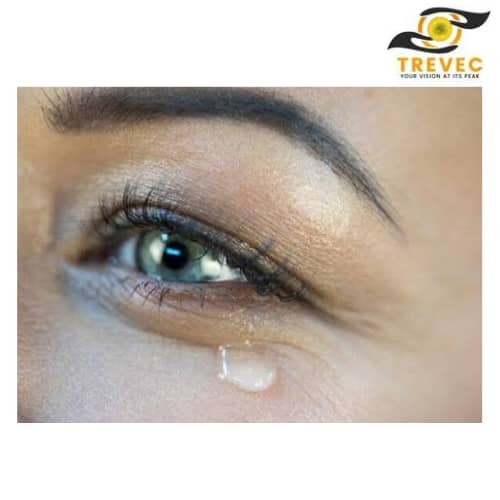At this juncture, we have familiarized ourselves with the causes of epiphora. However, a common but familiar question is, “What are the signs or symptoms of excessive tear production in the eyes?” Fortunately, we have got you covered.
SYMPTOMS OF EPIPHORA
Indications of epiphora consist of various forms:
- Continuous tears streaming down the face or watery eyes
- Accumulation of tears in the eyes without crying or laughing
- Excessive tearing in response to irritants like wind or light
- Formation of crust or discharge around the eyes
- Swelling and redness of the eyelids
- Blurred vision due to excessive tears
- Eyes are feeling excessively moist or watery.
- Eye feeling excessively moist or watery.
- Tears streaming down the face.
HOW IS EPIPHORA TREATED
Treatment for watery eyes varies depending on the underlying cause. Many individuals experience temporary epiphora that resolves on its own without treatment. Common treatments include:
MEDICATIONS: Allergies or infections causing watery eyes may require medication. In the case of dry eye syndrome, artificial tears supplements
might be given, while in other cases, eye drops such as Antibiotics or anti-inflammatory medications.
REMOVAL OF FOREIGN BODIES: Surgery may be necessary if the foreign object in the eye has caused severe damage to the eye to address the issue or the eye has been injured
CLEARING BLOCKED TEAR DUCTS: Blocked tear ducts can be flushed with a saline solution to remove the blockage. Other times, manual intervention with a probe can open the tear ducts (probing). When the tear ducts are obstructed or damaged in a way that saline or a probe cannot help, surgery intervention of the nasolacrimal duct may be necessary.
EYE OR EYELID REPAIR: If the structure of the eyes or eyelids is causing epiphora, eyelid surgery or reconstruction can correct such damage. However, surgical correction may be necessary.
CAN I MANAGE WATERY EYES SYMPTOMS?
Yes!, by following the instructions given by your optometrist regarding medication usage to manage epiphora symptoms, and refrain from rubbing your eyes. Additionally, avoid touching your eyeball with items such as tissue or a towel when drying excess tears, as it could exacerbate the issue or cause eye damage.
HOW CAN I REDUCE THE RISK OF EXPERIENCING EPIPHORA
Preventing watery eyes may not be possible, depending on the cause. If your eyes are irritated due to environmental factors or allergies, it may be challenging to avoid watery eyes. Therefore, use appropriate protective gear, such as eye protection like goggles or sunglasses, for tasks or activities that may pose a risk to your eyes. If feasible, try to steer clear of allergens that trigger your symptoms. Proceed to discuss potential strategies to prevent watery eyes with your eye doctor.
CONCLUSION
In most cases, epiphora is temporary. It may be a reflex action in response to allergies that persist until the eyes heal following irritation from a foreign object. However, if tears do not drain normally, causing the eyes to be always watery, treatment may be necessary. However, watery eyes improve after treatments, leading to a full recovery with clear vision. For more information on symptoms or expectations based on the cause of your watery eyes, contact TREE TOP VISION EYE CENTRE (TREVEC), the best eye clinic in Utako-Abuja.
TREVEC CARES!!!



Very enlighten… Thank you
YOU’RE WELCOME